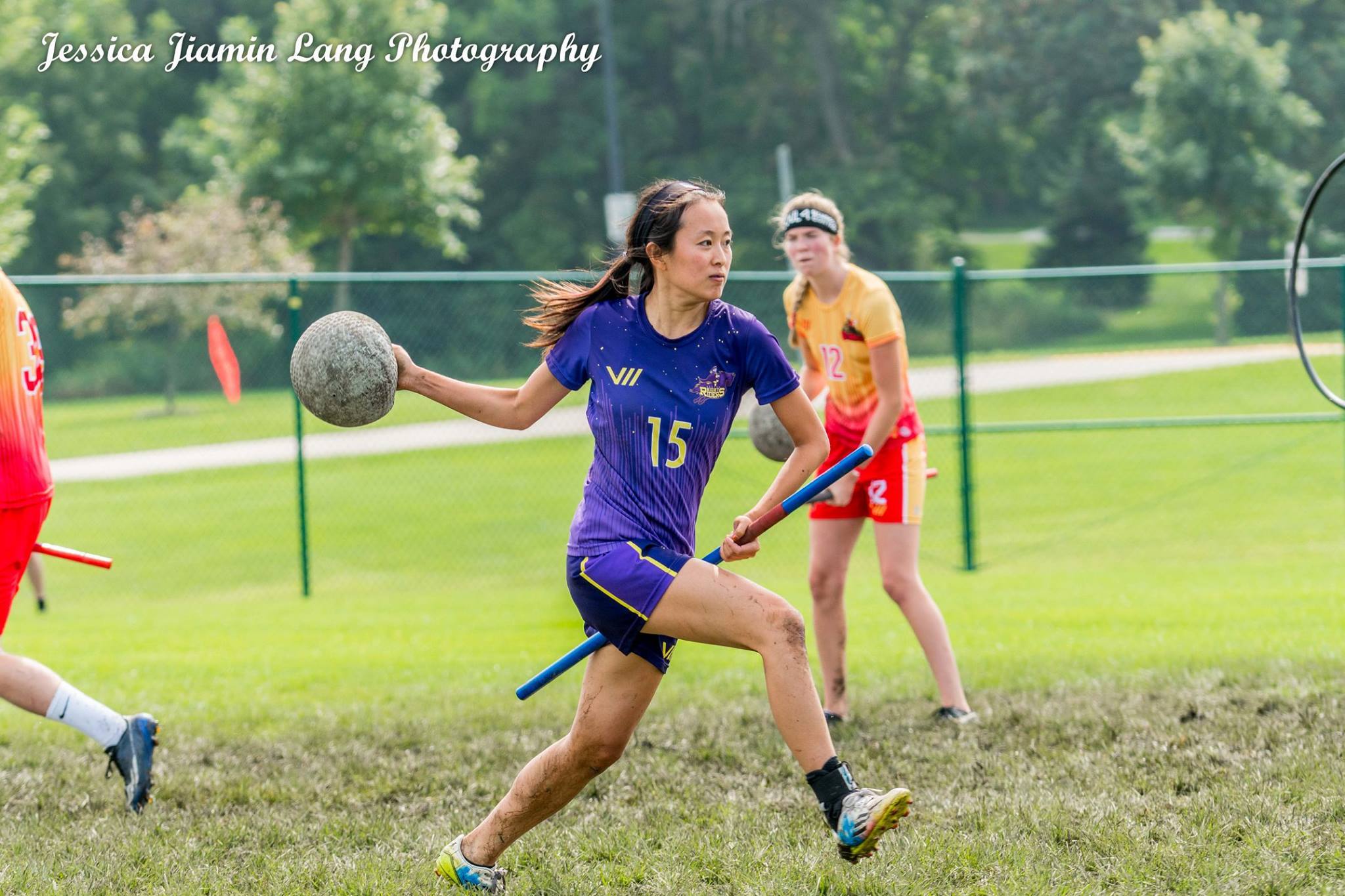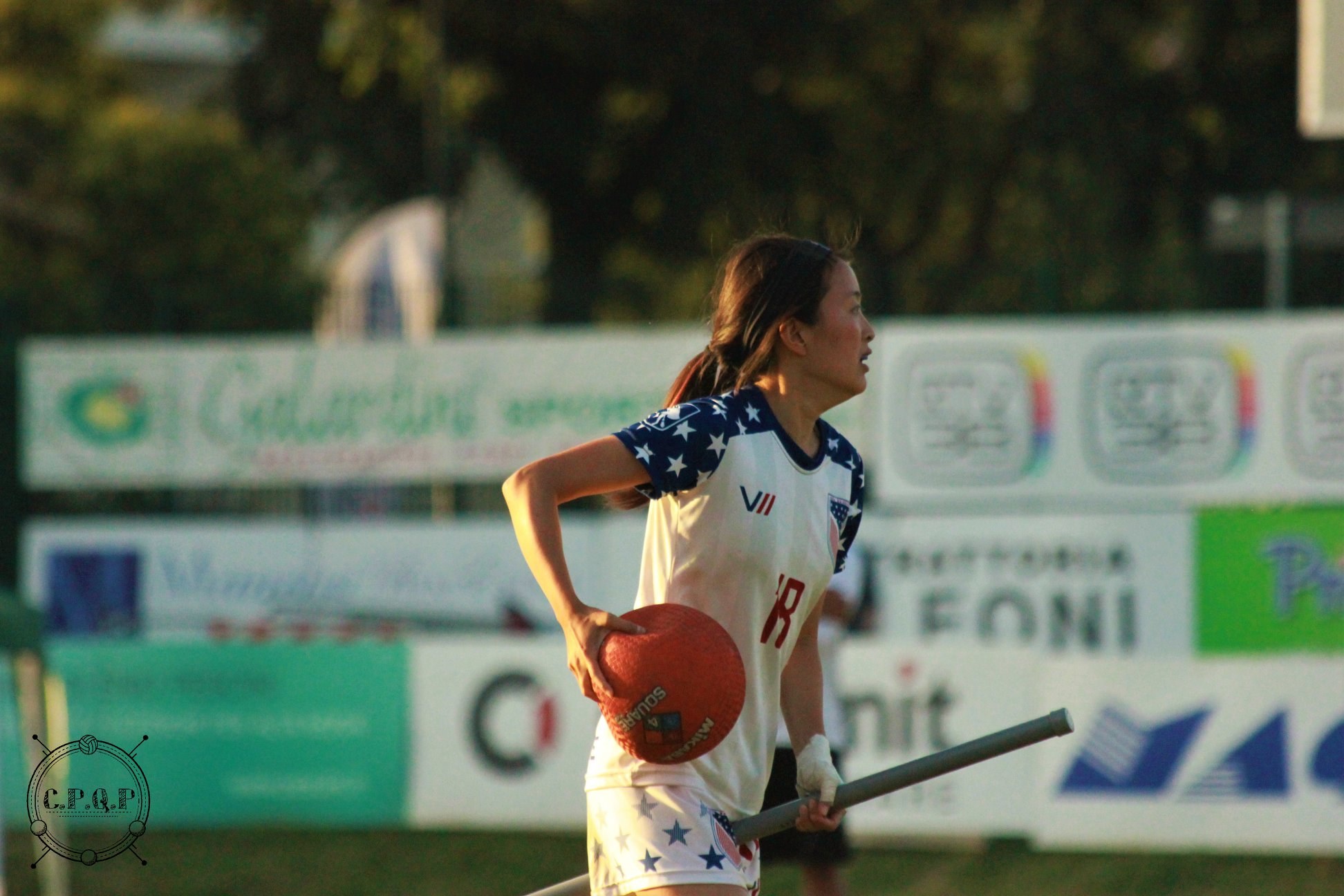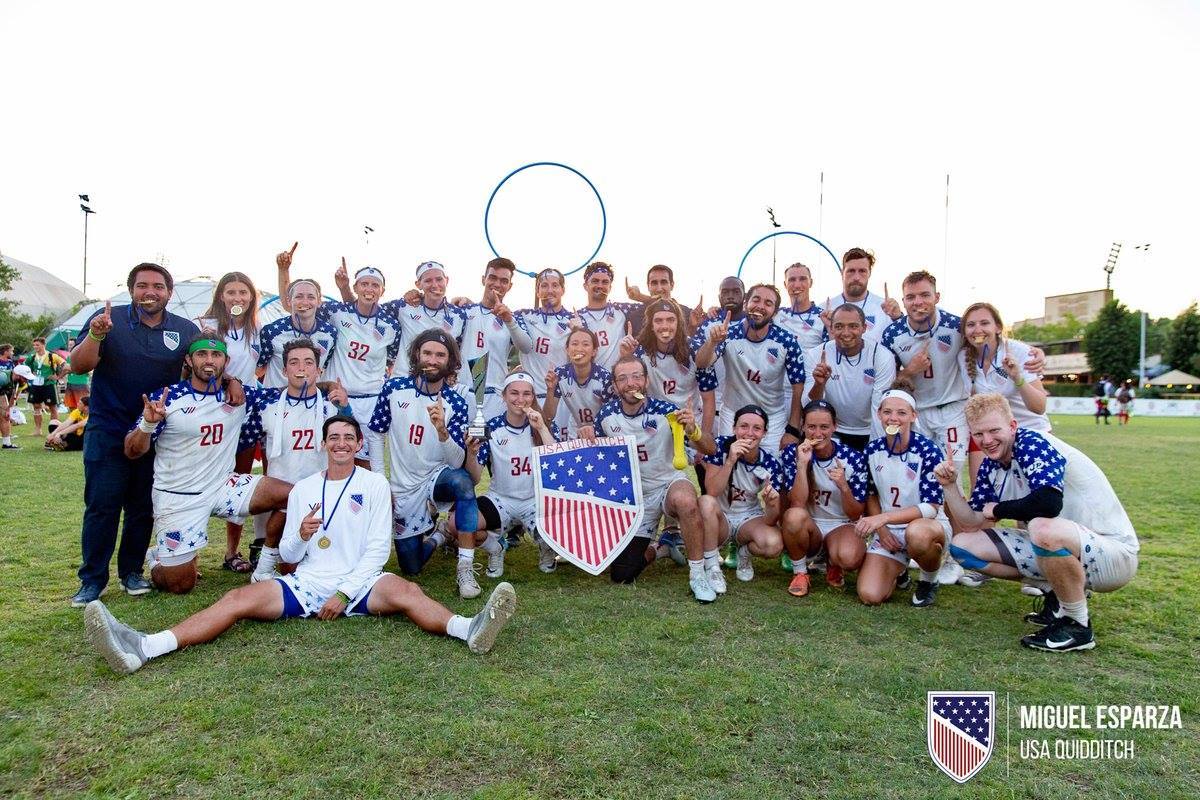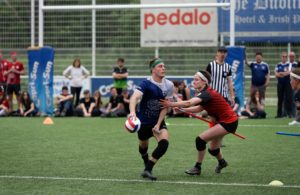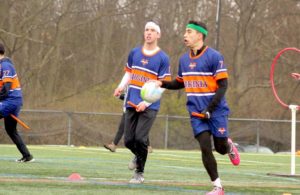- Rule, Britannia, no more?
- Unpopular Opinions: US Quadball Cup 2023
- Proven Contenders: University of Virginia
- Proven Contenders: Rutgers University
- Proven Contenders: University of Michigan
- Proven Contenders: Creighton University
- Different Perspectives: A Look Inside USA Ultimate
- Antwerp QC, Much of Belgian Core, Leaves Competitive Quidditch
Guest Column: The Importance of Recognizing Bias and Intersectionality in Quidditch
By Lulu Xu, Guest Writer
(Photo Credits: Jessica Jiamin Lang Photography)
Since the cancellation of the 2019-20 USQ season and 2020 MLQ season, race and gender conversations have been at the forefront of discussion within the quidditch community. After taking time to reflect, I wanted to share some of my experiences and bring attention to the unique impacts of intersectionality from my perspective of being a woman of color in quidditch.
First of all, I want to be clear that I do not feel my experiences are close to what Black players have talked about in the BIPOC Town Hall meetings. I am privileged to have never felt unsafe traveling across the country to tournaments, and I have not felt unfairly targeted by referees in games, which are the least of issues that we should be immediately addressing. Additionally, it’s important that we continue to work on bringing gender parity and inclusivity to the sport on and off the field as that can potentially benefit female and non-binary individuals of any race. However, I do feel my experiences have been different from some of the frustrations that have already been expressed. It has been difficult for me to differentiate what aspects of these experiences have been influenced by biases due to my race and what has been due to my gender, which speaks to the importance of recognizing intersectionality.
I had a fairly different start to quidditch compared to many of the other successful beaters currently in the sport. For my first three years at Boston University, I struggled to be seen as a valuable athlete and could barely even make it onto the roster. I wasn’t selected for the traveling team at all as a freshman, but at the time, I understood my place as a first-year player and did not mind just playing intramurals until the following year. My sophomore year, I only made it onto the traveling team’s reserve squad. This was a group of players that could practice with those on the standing roster, but only a small number would be selected to fill out the last few spots on the roster before each tournament, whereas players on the standing roster had automatic roster spots for all tournaments, including Nationals, from the beginning of the year. The reserve squad was essentially like extended tryouts that lasted the whole year. My captains told me that despite thinking I was the best new beater at tryouts, they thought other players chosen for the standing roster may have more potential because I was “too small” to actually play in a real game and that I would “get hurt”. This was confusing and demoralizing feedback because I had never actually gotten hurt playing quidditch before, and there was nothing I could really do about my size. It felt like an unfair judgment was being made about me solely based on my appearance, and I hadn’t even been given a real chance to prove myself. I wished they had given me any other reason for why I wasn’t selected. There were already three other female beaters on the standing roster so my chances of making the roster were unclear. Nevertheless, I was one of the reserve players selected for the regional and Nationals roster and I was so happy to be on the team in any capacity that I didn’t discuss it with the leadership again.
By my junior year, I was confident in myself as a player. The summer before, I had played in quidditch pickups every week with other players in the Boston community. I had been drafted as a starting beater in my first Northeast Fantasy tournament where I had played against well-known beaters from across the country and had not felt overmatched. I was excited to be able to use everything I had learned to contribute to my real team. However, I once again only made it onto the reserve squad, along with primarily new players, and I was left off the roster completely for our first tournament. I was given no feedback until one of the captains eventually told me, again, that the primary reason for this decision was concern about my size. I had played enough quidditch successfully outside my school by now that I felt justified in my frustration. I had also seen plenty of other small women play on other teams, so what was so different about me? I wondered if I should just quit playing altogether because it did not seem like there was much opportunity for me to ever play if size was the main barrier. I even briefly thought about leaving when I was offered a spot on QC Boston, but I ended up prioritizing my friendships on BU over playing time.
I want to make it clear through all of this that I do not think my captains were being malicious or even purposefully unfair. I think they were prioritizing the athletes who they thought had the most potential, and the leadership had an archetype in mind of what they considered to be athletic. It was not far off from what the rest of the country seemed to value in their top quidditch athletes. I did not know of many players that looked like me–small, Asian, female–who were discussed as a top athlete in quidditch discourse. Where I grew up, most of my teammates before college were white, and I did not know of many well-known Asian female athletes in general. At the end of the day, I understand the theoretical advantages that “size” can have in a full-contact sport, although to me there are far more advantageous skills for a beater like positioning, decision-making, field awareness, etc. that largely do not have physical limitations. Focusing primarily on size and a preconceived notion of who looks “athletic” allows for unconscious racial and gender bias particularly to people who are unused to playing sports with many women of color.
To be honest, I did not necessarily connect the possibility of unconscious racial bias with what I felt were unfair evaluations made about my size and potential impact as a player while I was in college because it’s easier to give the benefit of the doubt to people I liked within a community that was overall welcoming. It wasn’t until I listened to other players at the BIPOC Town Hall meetings and roundtables talk about assumptions made about their abilities by their white captains and coaches that I realized I wasn’t alone. One of the issues brought up at the POC roundtables is that if you are a minority, whether a person of color or a woman or non-binary individual in a white, male-dominated sport, you have to work harder and be more impressive to earn the same amount of respect. I felt like I had to do even more to prove I deserved to be even considered for a seat at the table when other teammates were spoon-fed opportunities before having to prove anything.
Photo Credits: Claire Purslow Quidditch Photography
Throughout college, I put in the extra work. I attended every practice with BU and took any competitive opportunity I was allowed as seriously as if I was in tryouts. During every summer and winter break, I was the only player on my team to go to every single weekly Boston pickup game to play with players from other schools, no matter the heat, snow, or rain. I attended any local fantasy tournament that I could just for the chance to compete. When teammates skipped out on practice or complained about having to travel for tournaments, they did not realize the privileges they had of being automatically valued with little effort.
I spent my entire junior year trying to prove I could be an asset to the team as the 21st spot on the roster for Nationals. I was the only BU player signed up for a big fantasy tournament that winter and my friend on leadership suggested that if I played “extraordinarily” enough to be featured in a recap article then it could be a final opportunity to help change the other captains’ minds. This was a hail mary piece of advice that was unlikely to even be true, but it highlighted for me how silly it was that I had to go above and beyond what my teammates needed to do. I was warned by my captains for most of the year that I would probably not be selected for Nationals and, if I was, I would probably not get to play. By the spring, I didn’t even care about playing time. Some of my best friends on the team were seniors and it was unfathomable to me that I was not going to be there with them at their last tournament after playing together for three years. When I did unexpectedly make the roster right before Nationals, I was told in private that it was merely just to put pressure on one of the other beaters to work harder, which was an uncomfortable situation for both of us.
I want to be clear that I think the other three female beaters on the standing roster were all great players and deserved to be there. There is no reason why a fourth female beater should be considered any less valuable for the last roster spot or worth developing for the future compared to players of another gender or position. The main issue for me is that I felt like I was never given a chance to be better. Every year there were white or male players who got the benefit of the doubt and received roster spots before ever playing more than even a few weeks of quidditch, whereas I needed to prove I deserved it over and over again on the reserve squad every year. I was the most experienced player on the traveling team who could not make it onto the standing roster after three years of playing quidditch. I was not given feedback on how to improve and was at times told outright that I probably wouldn’t be able to handle the physicality of a real game.
I cannot say for sure how much unconscious bias about my race, gender, or a combination of the two affected objective evaluations about the impact of my size or the quality of my play. However, this is a shared sentiment expressed by many players of color at the BIPOC Town Hall meetings which our white counterparts do not have to face. The uncertainty about objective feedback from male coaches is also something I have heard from female and non-binary athletes. It is important for captains and coaches to note that unless there is specific feedback, this uncertainty will always be there because those of us who are not white and male constantly thinking about how race or gender may impact the way we are perceived in our daily lives.
In the context of quidditch, I have always been very conscious of how I look to people who have never seen me play and of unconscious biases other people may have about an Asian woman. I was elected as a captain for my senior year at BU, but I was much more comfortable with allowing my male and white female counterparts to be the face of the team when we recruited for new players because I was worried that if someone only saw me representing the team, they would automatically assume it was just for Harry Potter fans who are not serious about competitive sports. I’ve encountered countless microaggressions, from people expressing shock that I’m a player and not just a fan, to people joking that I look like a child next to real athletes. They don’t bother me now, but it’s these kinds of assumptions that can affect a young player in the most crucial years of their development in a new sport. One of my club teammates later admitted that if I had come to try out for his team as a freshman, he probably would not have paid me any attention either. I can’t help but wonder, if I looked more like the archetype of a strong female athlete with the exact same skills, would I have struggled as much as I did in college to get opportunities for development?
I was very lucky that I found coaches after graduation who did see potential in me and gave me a chance to play. Just two years after almost not making it onto my college team, I won the USQ Cup with QC Boston as one of the starting beaters, thrusting someone that looked like me into the national discussion for the first time. By the time I was selected for the 2018 USNT, I had won a USQ national title, two MLQ national titles, three MLQ divisional titles, three Northeast regional titles, and three Oktoberfest Invitational titles in just three years. Even with all the proven success, I felt so grateful to even be noticed and considered an integral part of my beater partnership because I was used to being overlooked. I wasn’t even surprised when people still debated whether other beaters could have been on the USNT as a partner for Max Havlin, my primary beater partner for those last three years. It’s silly, but even now, despite having won championships at every level of quidditch, every time I play, no matter competition or practice, I feel the stress of needing to prove that I deserve the success I’ve had.
Photo Credits: Miguel Esparza
Where do we go from here? We’ve talked a lot about changing power structures at the top of quidditch organizations, and while those are undoubtedly vital to encouraging more diversity, the change at the most basic ground level cannot be understated. When I was in college, the power structure of quidditch was entirely within the context of my college team. A lot of players came and left our program before they even reached the level of consistently making the roster for the tournament team or even knew who the nationally successful players were, and I was almost one of them. I had 10 different captains in leadership during my first three years with BU, so this was not a result of judgments from a couple of people, nor was this likely an isolated experience. How many other players on other teams ended up quitting before they actually reached their full potential because it was assumed that they could not grow more as a player? I want to emphasize again that I don’t think there was any ill intent behind these decisions. I have gone on to play with or against some of my former captains since graduation and they have all been very supportive. I think it shows that even teammates and leaders with good intentions can make potentially mistaken face-value judgments.
If you hold any leadership, especially on a college quidditch team, I hope what you take away from this is that at the very least it is important to check your biases when evaluating players. It can be hard, and you might not always be “right” about how much they will develop, but your decisions and feedback can drastically affect the way a young player sees themself. If you have reasons for thinking a player is not up to par, give them legitimate feedback that they can work on instead of dismissing them for reasons they can not control. Give players the same room to grow that you would give any other player based on appearances instead of projecting your assumptions onto them. If you did not grow up playing sports with BIPOC, you may have unconscious biases that affect the way you judge and prioritize players, whether it’s that Asian players are not athletic or that Black players are too aggressive and draw too many cards. Keep in mind that these biases for women and non-binary people of color can be even more extreme and less tolerant. While male players often talk about racial biases in the form of wanting more recognition, which is definitely valid, for women, it can severely affect opportunities for development at a much earlier stage.
If you are a captain, coach or player who has unknowingly benefited from the privileges of your race and/or gender in sports, it is OK to recognize that you could have done better in the past and try to change for the future. There have been many white and/or male coaches and teammates over the last few years who have given me support and opportunities when I did not have the same power or voice in my first few years as a player. What we need, along with making room for more diverse voices in leadership, is for white and male teammates to use their privileges to be allies for players who still do not have power or a voice.
For other players with similar experiences or doubts as me, you are not alone. When I was in college, it felt like no matter how hard I worked, I could not be valued in the way as many of my white and male teammates, and for a time I really internalized that maybe I would never be good enough to even have a secure spot on the roster. I did not think it was possible to be where I am now. When I was actually selected for the USNT, I again felt self-conscious about how I looked and whether the general public would think that I deserved to be among these other spectacular athletes. But in the end, it really didn’t matter. On day two of the 2018 IQA World Cup, I was still chosen to be one of the starting beaters for the best team in the world. It was not easy to get here, but if there is anything I want to show, it’s that if I can get here, other people that look like me can too.

